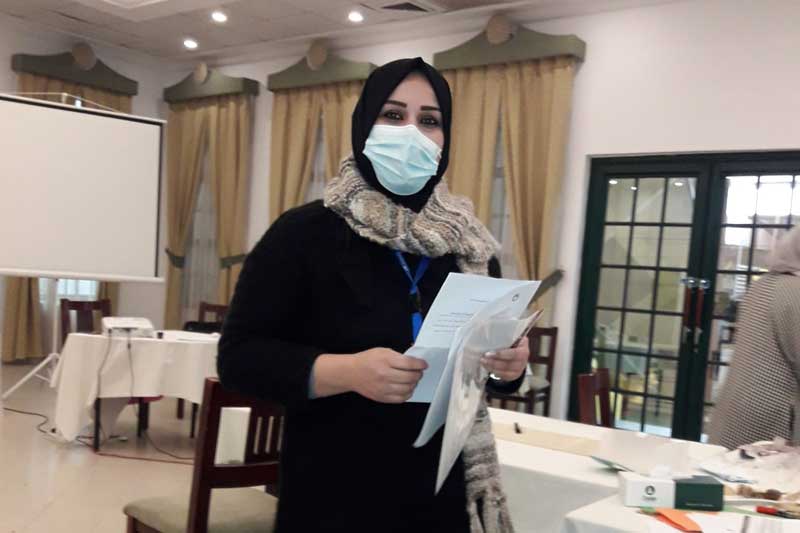Thursday 20th May (the day before the ceasefire):
"We live in Gaza, nearest to the border. Right now, there is constant bombing around my house, including rockets and attacks."
"I live with my family. I have 3 kids, 2 boys and one girl, and my husband. It is really difficult. We are all afraid. I fear for myself, my family and my husband. I’m thinking of my mother, my brother, my sisters and all of my loved ones. I’m really scared that I might lose someone."
"On TV I see what’s happening in the city where many children and women are killed inside their homes. They were safe inside their houses, and they couldn’t do anything. They couldn’t escape. I always think about this, it could happen to me. Nowhere in the Gaza strip is safe, so you can’t go or evacuate to a safer place because the bombing would still be right behind you."
"I’m always tense and worried and haven’t sleep in 4 days. I worry that nearby houses are evacuating and they forgot to tell me. What would happen to us ? I spend a lot of time looking out the windows to see if there are people in the streets, if people are leaving to go to other places. I also watch the movement of ambulances, especially at night. Each evening is a nightmare. I always fear for my family, because I know I will not be able to protect them."
"Yesterday, was really horrible. The bombing surrounded our house and many needed to leave during the day to escape from bombing in the streets, but some thought they would not be affected by the strength of the rockets. They stayed in their homes and when the bombing happened, many were forced to leave at 2am to seek shelter and find safety. It was a really terrifying night."

© HI
The children are afraid of everything
"I do my best in order to keep my family engaged during the day. We play together, we eat, and we pray. But sometimes I’m so afraid and I can’t even talk to anyone about it. We can’t leave our home. We can’t move around."
"For my kids, the whole atmosphere around them is horrifying. They hear the bombing all the time, and it’s really loud because it’s so close to our house."
"One of my kids was sick for 3 days. He had a fever due to experiencing so much panic. My daughter is only 2 years old, so when she hears the bombings or sees the curtains move from the blast, she runs away and screams, “Bombing ! bombing !” They hang onto me all day to try and feel safe. One of my kids is not showing much response, but one night he was shaking and screaming all night."
"So, all this is really difficult for them as children. We don’t know how they really feel their emotions and each one has their own way to experience it. They are afraid of everything around them. If they hear a door close, they get scared and run away. If they see something moving, they are afraid and think it’s more bombing."
I can see the impact of our work
"I try to forget my fears by being committed to my work and by responding to the needs of vulnerable people. I work as a rehabilitation task force coordinator, and have been working with HI for 7 years. It is important to me to support people during emergencies."
"I joined HI during the war of 2014 to respond to the needs of the emergency. I see the impact of our intervention on the people, and the need for HI and partner services."
"I can see that I contribute through the emergency response project that we are running now with our partners. We identify and screen the needs of the IDPs that go to the shelters and the hosting communities, and I ensure that our teams properly identify and respond to the needs of people with disabilities and people that are vulnerable."
"I’m so proud to do this. There is a high need for multidisciplinary services like physiotherapy and wound dressing sessions to cope with current injuries and prevent disability. There is also need for assistive devices. Usually the needs of injured people change after a few weeks or a month because there is either a deterioration or improvement in their condition, so there is need for assistive devices and rehabilitation support."
The level of destruction
"In 2014, the whole conflict lasted around 51 days. At the time, it was the longest escalation in the Gaza strip, and maybe it was the hardest experience. This is the 11th day of the current escalation, but the level of destruction by the 11th day is much higher when compared to the entire 51 days in 2014. The type of weaponry used by the two parties is more advanced. The number of civilians affected is higher than in 2014 compared with the duration. If you look at the statistics, you can see that most of the casualties are civilians. These people are not engaged in any military work."
"It is really difficult and has also caused destruction not only for the people themselves - the injuries or the killing of people - but also caused the destruction of the buildings, the infrastructure, the economy, all the streets are destroyed, including the ones leading to the main emergency hospitals in the Gaza strip."
"In Gaza, the economic situation is really bad, so these are poor families. They have limited access to basic needs and there is a need for the essentials such as water, food, medication, and cash. The need for mental health and psychological services is really high. There is daily loss of life and daily injuries, so this is the most difficult time to live.”






